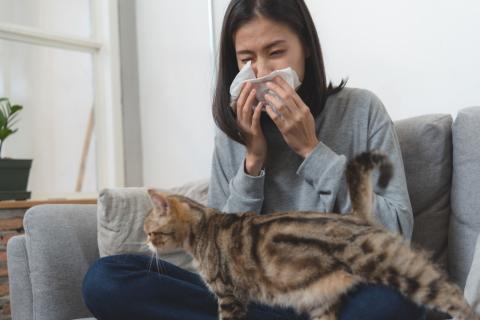A Better Treatment for Cat Allergies?

Photo: pormezz/shutterstock
An NIH study found an experimental approach added to allergy shots—a standard cat allergy treatment—made it more effective and faster acting, and the benefits persisted for a year after treatment ended. The findings were published in the Journal of Allergy and Clinical Immunology.
NIAID-supported investigators tested whether giving a monoclonal antibody called tezepelumab plus cat allergy shots to people with allergic rhinitis caused by cat allergens would improve symptom relief over allergy shots alone. Allergic rhinitis involves inflammation of the nasal membranes and causes symptoms such as sneezing, runny nose and watery, itchy eyes.
Tezepelumab blocks a protein called thymic stromal lymphopoietin (TSLP), which is secreted by cells that cover the surface of organs like the skin and intestines or that line the inside of the nose and lungs in response to signals of potential danger. In allergic disease, TSLP helps initiate an overreactive immune response to otherwise harmless substances like cat dander, provoking airway inflammation that leads to allergic symptoms.
The Phase 1/2 clinical trial, called CATNIP, enrolled 121 adults ages 18 to 65 years at nine medical centers in eight cities across the United States. The participants were assigned at random to receive either tezepelumab plus subcutaneous cat allergy shots, tezepelumab plus placebo shots, placebo plus allergy shots or a double placebo. No one knew who received which regimen until the end of the study.
Participants received one spritz in each nostril of a nasal spray containing cat allergen extract six times during the two-year study period. The study team recorded participants’ level of nasal symptoms and airflow through the nose at 5, 15, 30 and 60 minutes after receiving the nasal spray and hourly for up to five hours thereafter.
The investigators found that participants’ worst nasal symptoms were 36 percent lower at the end of treatment in the group that received tezepelumab plus allergy shots compared to the group that received allergy shots alone, and 24 percent lower a year later.
These results show for the first time that adding a cytokine inhibitor to allergy shots can reduce allergic rhinitis symptoms for an extended period after just one year of treatment.
With the successful outcome of the CATNIP trial, plans are underway for a NIAID-supported Phase 2 trial of tezepelumab plus oral immunotherapy for food allergy.
